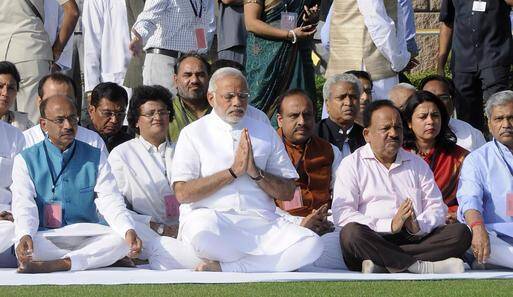Cape Cod, MA. I was remiss last week in not posting a comment on May 19, which was the 50th anniversary of the establishment by Pope Paul VI of the Secretariat for Non-Christians, with his Apostolic Letter, Progrediente Concilio. This Secretariat became in 1988 the Pontifical Council for Interreligious Dialogue.
I was reminded of this anniversary by Fr. William Skudlarek, OSB, who is Secretary General for the Monastic Interreligious Dialogue, and resident at the Trinity Benedictine Monastery in Fujimi in Japan. You can find at his very fine and useful website, Monastic Interreligious Dialogue, links to the key recent documents (which you find by scrolling down to the bottom of the home page):
Pope Francis' message sent on the occasion of the 50th anniversary.
Cardinal Jean-Louis Tauran's Dialogue in Truth and Charity.
"50 Years in the Service of Interreligious Dialogue," by Rev. Fr. Miguel Ángel Ayuso Guixot, Secretary of the Pontifical Council.
I will come back in a few days with some comments on these documents (when I've read them!), but wanted to post this blog today, before the anniversary is too far past. And, this is a timely anniversary, of course, in light of the news just these past few days. Consider two key events:
1) Pope Francis’ trip to Jordan and Palestine/Israel was a great balancing act of cultural, political, and religious values and energies, criss-crossing the boundaries among several Christian communities, as well as those of Jews and Muslims across the political/religious spectrum. While we do not want to reduce religious values to the political, neither can we naively insist that politics has nothing to do with religion.
2) The possibilities and tensions were evident this week in New Delhi too, as Narendra Modi was sworn in as India’s 15th Prime Minister, after a resounding victory in India’s recent elections, rightly termed the world’s largest exercise in democracy.
Many still have doubts about Mr. Modi’s interreligious values, given the murderous riots that took place in Gujarat in 2002, and the charge that his government, new to power at the time, stood by and did not intervene to halt the slaughter of innocent Muslims and Hindus. That he is strongly supported by Hindu parties and organizations need not be held against him — since when do we object to politicians having religious commitments? Moreover, for his installation as Prime Minister, he did his own political/religious balancing act, by an unprecedented invitation to the heads of neighboring countries to attend the ceremony, including Muslim Bangladesh and Pakistan and Afghanistan, Hindu-Buddhist Nepal, Buddhist Bhutan, and even Srilanka, a majority Buddhist country with significant Hindu, Muslim, and Christian minorities (but where the current president, of the Sinhala Buddhist majority, is unfortunately still aggravating interreligious tensions and refusing to promote the healing of the wounds of the long civil war). India itself, of course, ever struggles to balance economic and political concerns, and at the same time to preserve its unique forms of secularism and pluralism among its 850,000,000+ Hindus, 150,000,000+ Muslims, and small but deep-rooted and ancient communities of Christians, Sikhs, Jains and Buddhists and Parsees. Inviting all these leaders to New Delhi was of course a political gesture, but we can hope that its religious potential is appreciated too.
The challenges facing India are in most details different from those facing Jews and Muslims and Christians in Israel/Palestine today, and Pope Francis’s responsibilities are so very different from those born by an Indian Prime Minister. But even so, all the more now we need leaders able to respect religion, face political realities and infuse deeper respect for the dignity of individuals and communities into both politics and religion. I would like to think that the Pontifical Council, in its next 50 years, will play a still stronger role in working for harmony and understanding, together with all people of good will.
Pope Francis has invited the leaders of Palestine and Israel to the Vatican; perhaps on another day he could also invite Mr. Modi?







